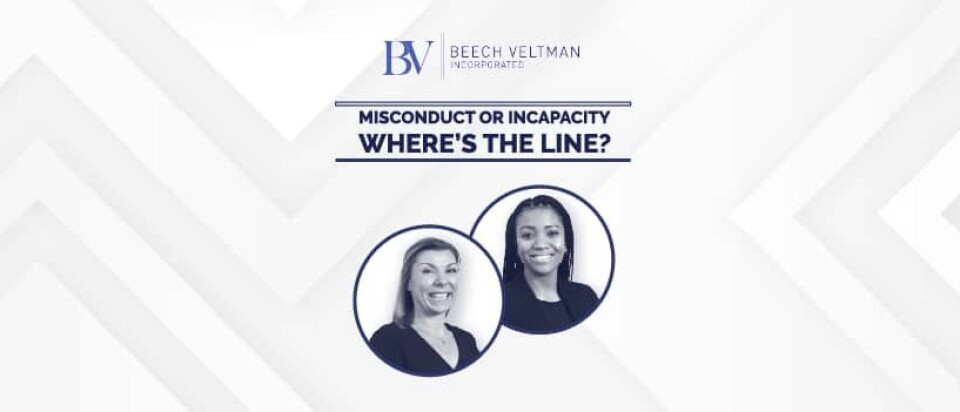Copyright : Re-publication of this article is authorised only in the following circumstances; the writer and Africa Legal are both recognised as the author and the website address www.africa-legal.com and original article link are back linked. Re-publication without both must be preauthorised by contacting editor@africa-legal.com
Misconduct or Incapacity – Where’s the Line?

Beech Veltman Inc (BVI) directors Refiloe Vengeni and Melanie Hart spoke to Sheena Carnie about distinguishing between misconduct and poor work performance when it comes to dismissing employees.
An employer wishing to dismiss an employee must act fairly and lawfully, in accordance with the provisions of the employee’s contract of employment. In order for a dismissal to be fair, the employer must prove that it was related to the employee’s conduct or capacity, or to the employer’s operational requirements and was effected in accordance with a fair procedure.
Sometimes it’s unclear whether an employee’s conduct should be seen as “misconduct” or “incapacity”, but due to the different procedural requirements related to dismissals for these categories, it is important to clarify the differences.
“The Labour Court of South Africa formulated the following simple way of testing whether the employee’s behaviour constitutes misconduct or incapacity,” explained Vengeni. “The employer needs to ask: ‘Did the employee try but could not?’ and ‘Could the employee do it, but did not?’ If the answer to the first question is yes, the employer is dealing with incapacity. If the answer to the second question is yes, then the employee’s actions constitute misconduct.
“Misconduct arises in an instance where an employee breaches a workplace rule and is at fault,” she clarified. “The element of fault takes one of two forms – intentional or negligent. This means the employee either intentionally performed the act which constitutes the misconduct, or negligently did so. Naturally misconduct committed intentionally is viewed more seriously than incidents involving negligence.”
Once blame is established, the employer is required to conduct an investigation to establish whether there are sufficient grounds for the employee to be dismissed for misconduct.
“The employer is also required to notify the employee of the allegations of misconduct in a manner and form the employee can reasonably comprehend,” Vengeni emphasised. “They must then afford the employee an opportunity to prepare a response to those allegations. Once the investigation into the employee’s misconduct is completed, the employer is required to communicate the outcome to the employee.”
“Incapacity, on the other hand, arises when an employee is willing to do what is required of him or her, but is unable to do so because of insufficient training or an underwhelming ability to perform, for example. Essentially, the employee is not at fault,” explained Hart.
“Poor performing employees should not be subjected to disciplinary action but must instead be counselled, and the employer must investigate the reasons for the unsatisfactory performance. The investigation is aimed at assessing the employee and establishing ways in which the employee’s problems may be overcome, such as by retraining, transfer or even demotion,” she continued.
The employer must afford the employee the right to be heard and to be assisted by a trade union representative or a fellow colleague during the counselling. Before dismissal may be considered, employers must ensure attempts were made to provide additional support or guidance, in an attempt to improve the employee’s level of performance.
“The bottom line in deciding whether or not the employer is dealing with misconduct or incapacity, is whether the employee is at fault and can be held responsible for the conduct complained of. Once the distinction has been made, the employer must follow a fair procedure,” concluded Vengeni.
To join Africa Legal's mailing list please click here
